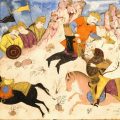Unpleasant symptoms
The work of the mammary glands in the female bodyare supported by 2 hormones – prolactin and oxytocin. The more often the baby is put to the breast, the more intensively the hormonal system works. And vice versa – as the baby gets older, he switches to solid food. Lactation processes gradually subside. Milk burnt - what is it?Photo: GettyA natural decrease in hormone production does not cause any painful symptoms. A woman simply does not feel the same fullness in her breasts. But if breastfeeding is stopped suddenly, a sharp failure occurs. Unpleasant sensations arise, including:
Milk burnt - what is it?Photo: GettyA natural decrease in hormone production does not cause any painful symptoms. A woman simply does not feel the same fullness in her breasts. But if breastfeeding is stopped suddenly, a sharp failure occurs. Unpleasant sensations arise, including:
- heat and heaviness in the chest;
- increased body temperature;
- nipple engorgement;
- pain, pressure in mammary glands.
To avoid these symptoms, lactation muststop gradually. The number of feedings every day is reduced by 1. The woman should drink less fluid, practice pumping and cool compresses on the nipple area.
Burnout during illness
The body's hormonal background changes duringailments. Breastfeeding women tolerate infectious diseases with fever especially poorly. At this time, unpleasant symptoms may appear - pain, heaviness, discomfort. To keep milk in the breast, you should:
- feed the baby as often as possible;
- decant if the baby is on the lure;
- drink hot tea with milk and walnuts, blackberry or currant compotes;
- eat chicken soup with onions and carrots.
These tips are also suitable for women whoare experiencing stress. There is a misconception that illness or stressful situations can stop lactation. Hormones do not stop working instantly. It is necessary to stimulate the mammary glands with the correct feeding schedule. Pay special attention to your drinking regime. You need to drink at least 10 glasses of liquid per day - water, juice, milk, weak tea. The cessation of lactation is a natural process. It will be absolutely painless if you wean your baby gradually and lead a calm, measured lifestyle. Read more:









